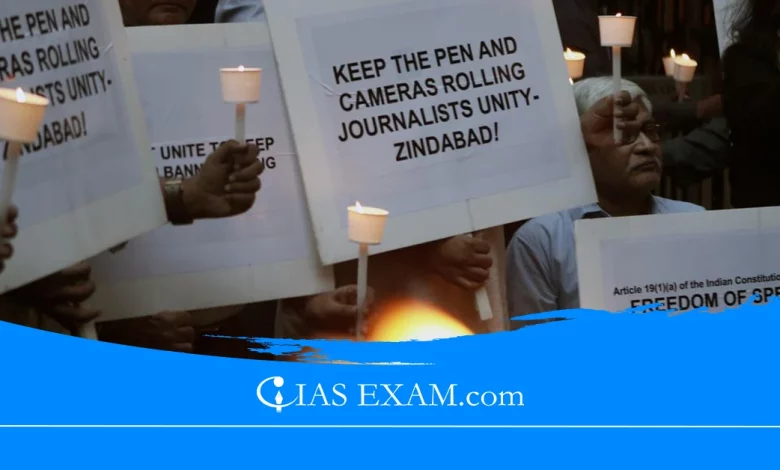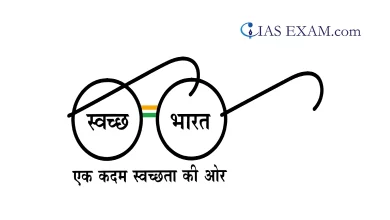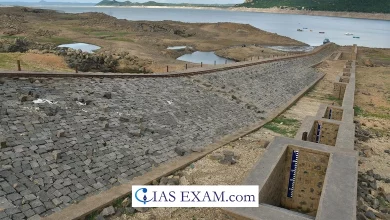Challenges of a broken Democratic Political Process in India
GS Paper 2 - Indian Polity, Parliament & State Legislatures

Context
Due to the loss of credibility, many institutional news media struggle to establish a factual foundation or maintain control over diverse social narratives, affecting society, media principles and the Political milieu in India.
India, often celebrated as the world’s largest democracy, faces a myriad of challenges in maintaining the integrity of its democratic political process. Among these challenges, the loss of credibility in institutional news media stands out as a critical issue. As the credibility of media institutions wanes, they struggle to establish a factual foundation and maintain control over diverse social narratives. This phenomenon has profound implications for society, media principles, and the political milieu in India.
Discourse in News Media
- Institutional Crises: Loss of credibility in institutional news media leads to a lack of establishment of factual baseline and narrative control. Without credibility, the news media struggles to maintain authority and trust, hindering its role in shaping public discourse.
- Impact on Public Discourse: The rise of social media has decentralized content creation and dissemination. Virality, rather than substance, becomes the primary measure of content value. Prioritization of engagement over quality and veracity distorts public discourse.
- Hyper-partisanship in Media: Loss of credibility in mainstream media contributes to hyper-partisanship. News and content are utilized as tools to promote factional interests rather than fostering dialogue and deliberation. Lack of interest in genuine discourse further exacerbates divisions within society.
- Fragmentation of Attention: The proliferation of media channels leads to the fragmentation of collective attention. A constant stream of transient content makes issues appear less significant. Gaining visibility and capturing attention becomes paramount, overshadowing the importance of substantive dialogue.
- Individual Battles and Tribal Affiliation: Public discourse becomes a battleground for individual interests seeking attention and reinforcing tribal affiliations. Lack of genuine dialogue hampers the evolution of consensus, further polarizing society.
Issues and Challenges
- Loss of Credibility in Institutional News Media: The loss of credibility in institutional news media stems from various factors, including biased reporting, sensationalism, and the propagation of misinformation. In an era marked by fierce competition for viewership and readership, media outlets often prioritize attracting audiences over upholding journalistic standards. This compromises the credibility of news media, leading to a loss of trust among the public.
- Impact on Society: The erosion of credibility in institutional news media has far-reaching implications for society. In the absence of reliable and trustworthy sources of information, citizens are susceptible to manipulation and misinformation. This can contribute to the polarization of society, as individuals retreat into echo chambers where their preconceived beliefs are reinforced.
- Challenges to Media Principles: The loss of credibility in institutional news media poses significant challenges to core media principles, such as objectivity, accuracy, and fairness. When media outlets prioritize sensationalism and clickbait over factual reporting, they betray their fundamental responsibility to inform the public. This erosion of media ethics not only undermines the integrity of journalism but also erodes public trust in the media as a whole.
- Impact on the Political Milieu: The loss of credibility in institutional news media has profound implications for the political milieu in India. Political actors often exploit the fragmented media landscape to disseminate their narratives and manipulate public opinion. The rise of fake news and misinformation campaigns has made it increasingly difficult for citizens to discern truth from fiction, leading to an erosion of trust in democratic institutions.
- Addressing the Challenges: Addressing the challenges posed by the loss of credibility in institutional news media requires a multi-faceted approach. Firstly, media organizations must reaffirm their commitment to journalistic ethics and prioritize factual reporting over sensationalism. This requires investing in robust fact-checking mechanisms and promoting transparency in news gathering and dissemination. Secondly, efforts should be made to enhance media literacy among the public, equipping citizens with the skills to critically evaluate information sources and discern misinformation.
Measures to be Taken
- Rebuilding Credibility: Implement measures to enhance transparency and accountability within news organizations. Encourage fact-checking and adherence to journalistic standards. Promote diversity of perspectives in news reporting to rebuild trust with diverse audiences.
- Regulation for Social Media Platforms: Implement regulations to combat misinformation and promote responsible content sharing. Foster partnerships between social media companies and fact-checking organizations to verify information.
- Promote Digital Literacy: Invest in education and public awareness campaigns to enhance media literacy among citizens. Equip individuals with critical thinking skills to discern credible sources from misinformation. Foster a culture of skepticism and verification when consuming news and information online.
- Encouraging Civil Society Engagement: Provide support for civil society initiatives that promote inclusivity and dialogue among diverse stakeholders. Enhance funding and resources for civil society organizations to reduce dependency on the state and encourage autonomy.
Conclusion
The broken democratic process is exacerbated by media credibility loss, civil society’s state dependency, and internal party issues. Rebuilding media trust, regulating social media, promoting dialogue, and empowering civil society is crucial for restoration. Only through collective action and concerted efforts can India address the challenges posed by the broken democratic political process and ensure a vibrant and inclusive democracy for future generations.
SOURCE: The Hindu





.png)



